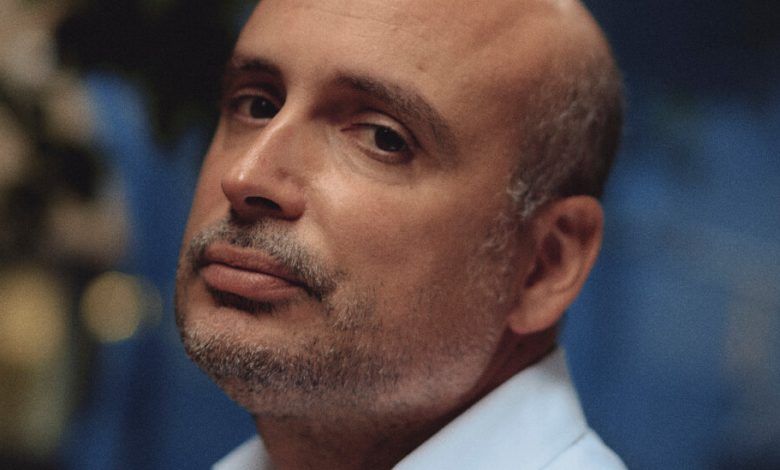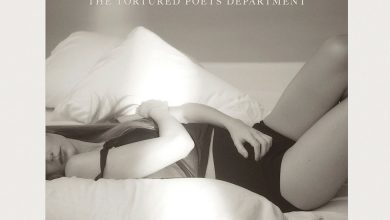Welcome to Peter Strickland’s Worlds

LONDON — “It started off as a joke,” Peter Strickland said. The British filmmaker, 49, thought it would be funny “to do a very loose biopic of a band no one’s heard of,” he said in a recent interview. He took his own avant-garde rock outfit, The Sonic Catering Band, as inspiration, and the resulting feature — “Flux Gourmet” — is not, even loosely, a biopic.
The film, which is released Friday in British theaters, is more of a satire about the creative tussle between a trio of performance artists (Fatma Mohamed, Ariane Labed and Asa Butterfield), the Englishwoman in charge of the institute funding their work (“Game of Thrones”’ Gwendoline Christie) and a Greek journalist with a sensitive stomach (Makis Papadimitriou) who spends most of the movie trying to suppress his flatulence.
In a film culture saturated with franchises, sequels and prestige remakes, Strickland’s off-kilter imagination is a different breed entirely. “Flux Gourmet” is the fifth feature he’s written and directed, and is his funniest, according to A.O. Scott, who called it “a witty philosophical speculation on some elemental human issues” in his review for The New York Times after the film’s U.S. theatrical release in June.
When it came to depicting unruly bowels onscreen, Strickland said he challenged himself to treat flatulence with “a degree of empathy and dignity, without wagging your finger and saying you shouldn’t find farts funny,” he said. The lengthy and plaintive eruption that can be heard in the film is, in fact, one of Strickland’s own.
The Romanian actress Fatma Mohamed, who plays the band’s creative leader Elle di Elle and has starred in all of his feature-length films, described a “Peter Strickland world” as “funny, sensual, weird and joyful” in a recent video interview. Each of Strickland’s films takes place in its own universe, shaped by the trash and genre cinema he gulped down as a teenager.
The rich histories of Giallo cinema and sexploitation informed “Katalin Varga,” his debut feature from 2009 and a riff on a rape revenge thriller, filmed in Transylvania; next came “Berberian Sound Studio,” about a British sound recordist creating foley for a B-movie slasher in Rome; “The Duke of Burgundy” (2015) is a kinky romance set in a parallel universe populated entirely by lesbians who study insects; and Strickland’s fourth film, “In Fabric,” tells the story of a killer red dress with an inner life of its own.
Strickland’s films whisper and rustle; their sonic landscapes induce an uneasy tickle on the back of the neck, a visceral drop in the pit of the stomach and, occasionally, the erotic sensation of goose bumps.
The director, who in person was soft-spoken and smartly dressed in a suit, said he was unusually attuned to sound as a child and remembered wistfully the slow rip of a football sticker being peeled from its adhesive backing. The noise, he said, was soporific and satisfying, like “a kind of mini euphoria.”
In “Flux Gourmet,” this lifelong fascination with sound is shared by the central group of “sonic caterers.” They treat sound the way a chef would food, using the raw noises of the cooking process as ingredients, chopping and blending them.
For Strickland, there is a common thread between his visceral reaction to sound, the films he makes and his love of musique concrète, a style of experimental music using recorded sounds. Upon discovering it as a teenager, that genre of music created “a cavity or a portal,” he said, that invited him into new and mysterious worlds.
Growing up, Strickland longed to be transported to new worlds. “I’m what you call a bad Orthodox kid,” he said. His mother is Greek, and he grew up in the commuter town of Reading, in an affluent middle class suburb “lacking any kind of cultural hub.” He described himself as an introvert, and lived at home while attending college nearby. “Quite often when a Greek kid moves out,” he said, “what that really means is they move upstairs.”
He also rebelled against his parents’ disdain for “anything with sex or violence,” he recalled, by seeking out cult movies. While leafing through a film magazine, he saw a still from David Lynch’s 1977 feature “Eraserhead.” In February 1990, at age 16, Strickland took the train into London to see the film at the Scala, a now-shuttered repertory cinema with an eclectic program. “That was my film school,” Strickland said. He became a regular.
Jane Giles, who ran programming there at the time, said she “saw and felt” the influence of “all the films he was turned on to at the Scala” in “Berberian Sound Studio.” She noted the 1986 lesbian S&M film “Mano Destra” as a particular influence on the director’s sonic approach. “The history of cinema has been sucked into the fetid imagination of Peter Strickland,” she said.
Strickland applied to study film and drama in the formal sense at the University of Reading, writing a passionate admissions essay on the experimental underground artists Jack Smith and Stan Brakhage. “I got rejected,” he said. Upon discovering a fellow applicant had written hers on Kevin Costner and had been accepted, he was freshly motivated to make films that sat outside the mainstream. “I thought, right, I’m gonna do something about this,” he said.
This led him to study fine art instead, during which time he escaped Reading to visit New York. Staying with a Greek aunt in Queens, he made his first short film, “Bubblegum,” starring Holly Woodlawn, one of Andy Warhol’s superstars, whom Strickland had tracked down using the phone book. The film did well on the festival circuit but didn’t give him a big break.
After graduating, he moved to London “to try and make it in the film world, and nothing happened, basically,” he said. He didn’t make a film for eight years. “I tried to do short films in that hiatus,” he said, but “no one ever funded my films.”
In “Flux Gourmet,” Strickland finds comedy in the tension between artists and their patrons. Jan Stevens, the benefactor character played by Christie, was “modeled on this composite of British film financiers,” Strickland said. Christie plays her with arch humor and crisp authority.
In the end, Strickland funded his own feature debut with a chunk of money he inherited from an uncle. In the spring of 2002, he moved to Hungary — “somewhere with cheaper rent,” he said. Eventually, “Katalin Varga” premiered at the Berlin Film Festival in 2009. He returned to England “just before the Brexit deadline,” he said, in 2020.
Living and working in Hungary and Slovakia for almost a decade has marked Strickland’s films. He thinks of his sensibility as European, though “my humor is very British,” he said.
“Peter works in a weirder, more surreal space than a lot of U.K. filmmakers,” the director Prano Bailey-Bond wrote in an email, who has cited Strickland’s work as a reference point for her 2021 film “Censor.” In an industry that can seem like it’s seeking out alternate versions of what’s already been successful, Strickland’s films are governed by their own strange rules.
“He’s given audiences a different slice of contemporary British cinema,” Bailey-Bond added.



